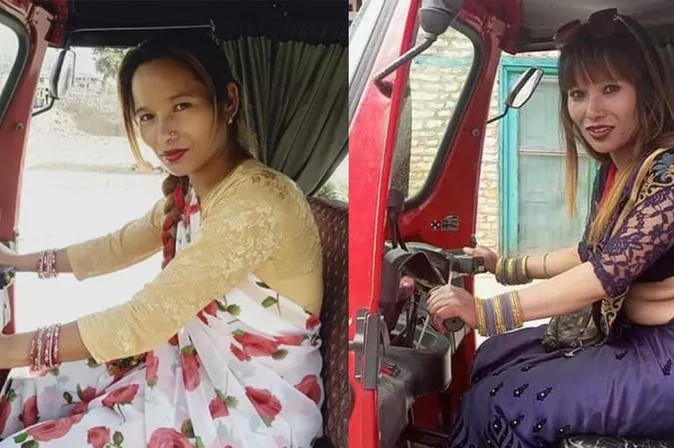Rickshaw operator in Jumla wants to encourage other women to take the wheel and gain independence
Maheshwor Acharya
Kathumandu (Nepali Times) – At an auto rickshaw stand in Jumla, Kalpana Budha stood out among a crowd of male drivers as she strode confidently towards her three-wheeler, ready to face another workday ferrying passengers.
What is striking about Kalpana in this socially conservative region of northwestern Nepal is not just the self-assured attitude, but also that she is the sole female auto driver and proud of it. Many do a double take when they see her driving around, her sari waving behind her, and gaze at her in admiration.
Kalpana’s first day on the job was quite the opposite. Other rickshaw operators gave her dark looks, whispering behind her back. Neighbours spread unkind gossip.
“In the beginning, people hated seeing me do what they told me was a man’s job,” the 32-year-old single mother recalls. At the time, people in this deeply patriarcal society would also bring up her separation from her husband to belittle and undermine her.
She adds, “Those were different times but now, most people tell me what a good of a job I am doing.”
Read also: Life cycle, Sonia Awale
Kalpana was married off by her family when she was only 13, but it did not last. Her husband abandoned her to pursue another relationship merely 17 days after she had her baby, and she was left alone with the responsibility of raising a child.
The young mother then returned to her parents’ house in Kalokholi village with a newborn, wondering how she would be able to support herself and her child. The stigma of single motherhood made it doubly difficult, but it was her brother Subhash who suggested she take up rickshaw driving.
Kalpana went to Surkhet to learn how to operate an auto rickshaw and obtained her driving licence. She then borrowed Rs600,000 and bought her own rickshaw six years ago.
Daily earnings are modest, but business booms during the apple season in September when orchard owners hire her to haul fruit. Pilgrims to nearby Chandannath Temple, or those going to the hotsprings in Tatopani are her main customers.
In the years since she bought her vehicle, Kalpana has paid half of her debt and has been able to enrol her son in private school.
She has now shifted her attention to teaching other women to operate rickshaws, and become self-sufficient economically.
“I have realised that women can make a living however they choose, be it operating a rickshaw, a convenience store, or a sidewalk food stall, you just have to not care what people say behind yourback,” she says. “All we need is determination.”
So far, Kalpana has found little interest among the women in her community to take up rickshaw driving. Two women did initially commit to learning, but one of them did not show up for lessons and the other gave up halfway through training.
“When I asked around about why she had stopped coming, I came to find out that her husband had reprimanded her for trying to learn how to drive,” she recalls.
There are more than 500 women who drive electric Safa three-wheelers in Kathmandu, many of whom also own their own vehicles. Some have moved on to buy taxis and run driving schools.
Female three-wheel drivers in Kathmandu have dissuaded many Nepali women from migrating overseas for work by providing a self-sustaining alternative at home.
“Even if there were just three more women rickshaw operators in Jumla, it would send the message that women can make their own way in the world,” says Kalpana.
Indeed, despite patriarchy Jumla was one of the few municpalities in Nepal after the 2017 elections where both the mayor and deputy were women.
Now, women like Kalpana are proof that societal norms and male discouragement does not have to be an obstacle.
“I spent many a day crying, questioning if it was worthwhile to live this kind of life,” she recalls. “But I realised that everyone goes through their own hardships, but what is important is to not give up. As long as we women can work, we do not have to be ashemed of anyone.”
Kalpana certainly did not give up. In fact, she is expanding her business and buying another three-wheeler.
INPS Japan/Nepali Times
Origina Article:https://nepalitimes.com/here-now/kalpanas-auto-autonomy




